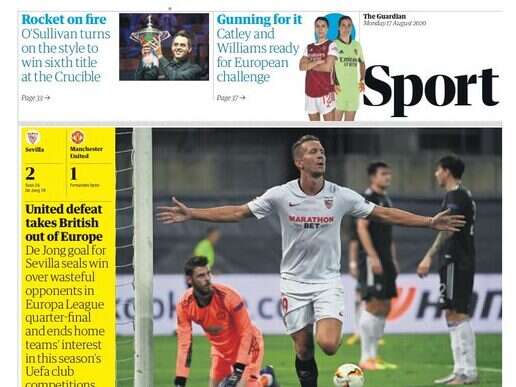
The Guardian’s sports coverage “simply can’t try to be all things to all people”, editor-in-chief Kath Viner has told staff who raised concerns about her cost-saving proposals.
The sports department is set to be one of the hardest hit at the newspaper, alongside the Saturday Guardian supplements and lifestyle teams, under plans to cut 70 editorial jobs.
Some 110 commercial staff are also expected to lose their jobs.
Viner and managing editor Jan Thompson have responded to a letter from a group of the Guardian’s sports editors, writers, production staff, contract employees and freelances raising concerns that the “drastic” cuts will do “immense damage” to the reputation of their coverage.
In their response, seen by Press Gazette, Viner and Thompson said: “We want to reimagine Guardian Sport digitally in a way that is consistent with our values and purpose and then translate that journalism as easily and cost-effectively as possible into a streamlined print newspaper.”
They said the overall amount of journalism produced by Guardian Sport ought to be cut, in particular by reducing focus on racing, club rugby and some other sports outside their major events.
Although football, rugby and cricket will continue to have dedicated reporters and correspondents under the proposals, other writers will cover a wider variety of sports.
They also said that some of Guardian Sport’s digital formats are “overdue a review”, that it now publishes “arguably” too many liveblogs online despite pioneering the format, and added that “in a digitally-focused operation with fewer print pages to fill we will need less commoditised news and match reports”.
The Guardian currently has eight to ten sports pages in print each day.
Viner and Thompson insisted they want to “maintain and strengthen the areas of Guardian Sport that our readers value most”.
“Women’s sport and sport’s cultural and socio-economic impact are areas that you mention in your letter that we would expect to preserve and strengthen under our proposals; likewise the investigative journalism and features that are a core part of what we publish.
“And we will remain fully committed to covering the biggest national and international events – from the World Cup to the Olympics, the Ashes to the Champions League – with flair and imagination.
“We will continue to break exclusive and reputation-defining news stories, deliver brilliant sports writing from some of the best in the country, and concentrate on those elements that our readers love most and differentiate us from our rivals.
“But due to the need to make hard choices, we will also have to do less in other areas… Given the economics, we simply can’t try to be all things to all people – nor do we want to be.”
A Guardian News and Media spokesperson rebuffed fears shared with Press Gazette by an insider that the letter could indicate plans to ditch almost all match reports, a staple of newspaper sports coverage, along with day-to-day news.
The spokesperson said: “We are proud of our distinctive, award-winning football coverage and under our proposals it will remain a key part of our offering to readers.”
They also denied that coverage of sports like athletics, cycling and golf could be limited to major events, such as the Olympics and Tour de France, alone.
Staff already feel “over-stretched and under-resourced”, according to their earlier letter.
The insider said morale was at its lowest for many years and pointed to added recent pressures of meeting a 12am final edition deadline on match days instead of 1am. The time was brought forward to help with getting the paper out during lockdown, but is now thought to be seen as a permanent change.
The sports staff had put forward a number of suggestions for generating more revenue, including pursuing sponsorships for their 5pm email newsletter The Fiver, charging for some or all episodes of the Football Weekly podcast, and appealing for contributions from loyal readers in sport-specific communities like horse racing and cricket.
But Viner and Thompson rejected their ideas, saying they “would be unlikely to come anywhere near to making the sort of revenue required”.
They said: “We have tried for many years to commercialise sport in different ways, through advertising and sponsorship. Our colleagues in the multimedia team will tell you that the reason that Football Weekly makes money from advertising is because of its huge reach. For that reason they would be very much against charging for it.
“As for reader revenue: we have tried in the past to target sport in terms of increasing reader contributions but the data shows that to date it has performed well below average in that area.”
The 45-day consultation period on the Guardian’s plans is due to conclude at the end of August.
A GNM spokesperson said: “We of course remain committed to year round coverage of a wide range of national and international sports, including the latest breaking sports news and match reports.
“We will also maintain and strengthen the areas of Guardian Sport that our readers value most: great sportswriting, investigative journalism, digital innovation, women’s sport and the features that are a core part of our offering.
“Our primary objective is to produce highly distinctive and award-winning journalism which will build deeper relationships with our readers, and encourage greater contributions to fund our world-class journalism.”
Email pged@pressgazette.co.uk to point out mistakes, provide story tips or send in a letter for publication on our "Letters Page" blog
